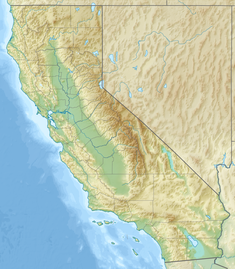Pit 5 Dam is a run-of-the-river hydroelectric dam on the Pit River in Shasta County, northeastern California, about 2 miles (3.2 km) south of Big Bend. It is part of the Pit 3-4-5 hydroelectric project owned by Pacific Gas & Electric Company.[4]
| Pit 5 Dam | |
|---|---|
| Country | United States |
| Location | Shasta County, California |
| Coordinates | 40°59′30″N 121°52′16″W / 40.99167°N 121.87111°W[1] |
| Purpose | Hydroelectric |
| Opening date | 1944 |
| Owner(s) | PG&E |
| Dam and spillways | |
| Impounds | Pit River |
| Height (foundation) | 58 ft (18 m)[2] |
| Length | 340 ft (100 m)[2] |
| Reservoir | |
| Creates | Pit 5 Reservoir |
| Total capacity | 330 acre⋅ft (410,000 m3)[2] |
| Pit 5 Powerhouse | |
| Installed capacity | 160 MW[3] |
| Annual generation | 781,328,000 KWh (2001–2012)[3] |
Specifications
editThe concrete gravity diversion dam is 58 feet (18 m) high and 340 feet (100 m) long.[2] It has a gated spillway controlled by four 50 ft × 26.3 ft (15.2 m × 8.0 m) steel wheel gates, and a 30 in (76 cm) diameter river outlet for regular releases. An intake structure diverts water into a 5,109-foot (1,557 m) long penstock to the Pit 5 Tunnel forebay reservoir, from which a second 23,149-foot (7,056 m) tunnel connects to the Pit 5 power station. There are four 40 MW generating units, each fed by a 1,380-foot (420 m)-long penstock.[5]
History
editThe dam and power station were authorized in 1942 and constructed as a wartime project, and the first power was generated on April 29, 1944.[6] Construction of the dam and power station dewatered a stretch of the Pit River known as the "Big Bend". When the projects were relicensed in 2007, a minimum 250 cu ft/s (7.1 m3/s) release[5] into the river was established, to provide recreation benefits such as boating and fishing, and to improve riparian habitat.[7]
See also
editReferences
edit- ^ "Pit Number 5 Diversion 97-107 Dam". Geographic Names Information System. United States Geological Survey, United States Department of the Interior. 1994-07-01. Retrieved 2018-04-28.
- ^ a b c d "Dam Name: Pit No. 5 Diversion". National Performance of Dams Program. Stanford University. Retrieved 2018-04-28.
- ^ a b "California Hydroelectric Statistics & Data". California Energy Commission. Archived from the original on 2018-02-26. Retrieved 2018-04-26.
- ^ "Pit 3, 4, & 5 : P-233". Hydropower Reform Coalition. Retrieved 2018-04-28.
- ^ a b "Draft Environmental Impact Statement for Hydropower License: Pit 3, 4, 5 Hydroelectric Project". Federal Energy Regulatory Commission. Mar 2003. Retrieved 2018-04-28.
- ^ "Pit 5 Powerhouse" (pdf). US Spec. Retrieved 2018-04-28.
- ^ "Pit 1, and Pit 3, 4, and 5 Projects" (PDF). Hydropower Reform Coalition. 2009. Archived from the original (PDF) on 2017-05-25. Retrieved 2018-04-28.
